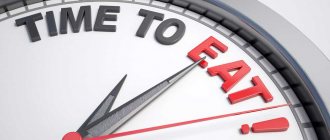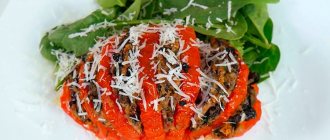Not all nutritionists welcome dietary restrictions after six in the evening. Some believe that it is enough not to eat 3 hours before bedtime, others argue that there are no prohibitions at all.
If you can’t sleep on an empty stomach - you suffer from insomnia and your digestive system suffers - don’t force yourself. You can and even need to eat at night if you have a high feeling of hunger. Suppose you spent the whole day on your feet, but there was no opportunity to eat, it’s time to go to bed, and there is a “hole” in your stomach. In this case, night hunger will be another stress for the body, so it is better to eat and try to go to bed 1 hour after eating. You just need to choose the right products that will not harm your health or figure.
In the morning, the body spends much more energy to digest food, and in the evening the rate of digestion decreases. Therefore, you should immediately exclude heavy high-calorie foods and alcohol from your nightly diet. Protein-rich foods are best for a late dinner. Fats and carbohydrates, on the contrary, should be carefully dosed.
We've got seven healthy late-night snack options for you. Choose yours according to your taste! Still, the “Eat at Home” website does not work to make you starve.
Vegetables
We already mentioned products of plant origin when we talked about meat and fish. Nevertheless, you can eat vegetables in their pure form if you bake them in the oven with spices, garlic and adding a small amount of butter. Vegetables can be grilled or made into a light puree soup.
If you seriously care about your figure, it is better to give preference to greens in any quantities, leafy (lettuce, spinach) and non-starchy (bell peppers, broccoli, tomatoes, cucumbers, celery) vegetables. You can also allow yourself some zucchini, eggplant, pumpkin, potatoes or carrots for dinner. The main thing is not to fry them in oil.
Of course, we have not listed all healthy late dinner options. The menu may also include low-fat cheese, beans and even citrus fruits. Does everyone know about the “magical” properties of grapefruit?
Combine foods to your liking, but follow the small portion rule. Then you won’t be afraid of extra pounds and digestive system disorders!
Tips for those planning to have a late dinner
If you cannot have dinner on time, take a small snack with you
A mixture of nuts, a sandwich with whole flour bread, and crackers are suitable. Then, when you get home, you will be able to eat a smaller portion and will not overeat at night.
Didn't manage to have a snack and haven't eaten anything since lunch?
Try to eat as soon as you get home. First dinner, then a shower, entertainment or household chores. In order for food to be absorbed, you need to have dinner 3 hours before bedtime. Try to adhere to this period of time.
Photo: Marco Verch Professional Photographer and Speaker (CC BY 2.0)
On the contrary - you had dinner earlier, but now you’re hungry again?
You can drink a glass of water, eat a baked apple or a handful of almonds. Make a sandwich, but not with sausage, but with boiled chicken breast and cucumber. A small snack is enough to satisfy your hunger and fall asleep.
Don't eat in front of a screen
When watching a movie or TV series, you don't notice how much you've already eaten. It seems that you still need to run to the refrigerator for more. So, during a full dinner, you can still turn on your favorite TV series, but if you decide to have a late snack, do it in the kitchen. This way you can control your satiety and not confuse hunger with a simple desire to “chew something.”
Photo: pxhere (CC0 1.0)
Circadian rhythm and food
The theory that eating late can lead to eating more is partly a myth. Some scientists believe that the “night glutton” is not consistent with our circadian rhythm - a cyclical fluctuation in the intensity of various biological processes during the day. According to the circadian rhythm, night is a time for sleeping, not eating. Animal studies have confirmed this theory - it turned out that mice that eat in the evening or at night gain more weight than their more disciplined counterparts, even when consuming the same amount of food.
But similar studies in humans showed a different picture: weight is affected not by the time of food intake, but by its calorie content. After studying the eating habits of 59 adults, scientists discovered an interesting trend: those who eat before bed eat more calories than those who ate dinner no later than 20.00. And people who have a habit of emptying the refrigerator between 11 p.m. and 5 a.m. consume, on average, 500 more calories per day.
Late dinner. 7 foods to eat before bed
The number of calories in a product is not as important as their quality. There are empty calories, for example, in buns and sweets, and there are healthy ones, such as in vegetables and nuts. If you are now trying to bring your weight back to normal, then first of all you should control portion sizes, food combinations and meal times. And if you still have to snack at night, then choose foods that will quickly give you a feeling of fullness and will not cause much harm to your figure. So what can you eat late at night?
1. Apple
100 grams of fruit contains 52 kcal. It also contains pectin, a dietary fiber that naturally slows down the digestion process, swelling like a sponge inside the intestines. It is for this reason that, after eating an apple, we can forget about the feeling of hunger for a long time. And in combination with oatmeal or plant milk, the fruit will be the safest for those who have problems with acidity.
2. Almonds
576 kcal in 100 grams of nuts. Due to the very high calorie content, you can eat only 6-7 pieces at night. Almonds contain healthy fats and fiber. In small quantities, it reduces the feeling of hunger, and if consumed regularly, it reduces the need for consumed calories in principle.
3. Avocado
100 grams of avocado - 160 kcal. And also vitamins B, A and E. In addition, the avocado fruit contains potassium. By the way, everything that you don’t eat can be safely applied to your face as a cosmetic mask. Avocado is rich in healthy monounsaturated fats, which perfectly nourish the skin on the outside and take a long time to digest inside, thereby suppressing appetite.
4. Dark chocolate
539 kcal per 100 grams. According to a study, two pieces of dark chocolate with at least 70% cocoa content reduces cravings for sweets. This is due to stearic acid, which suppresses appetite.
5. Egg
155 kcal per 100 grams, one egg usually weighs 50-60 grams. It is an essential source of protein and amino acids. It is protein that helps suppress appetite, which makes it the most suitable product for dietary nutrition. However, you shouldn’t overdo it either; it is recommended to eat no more than 4 eggs per week.
6. Oatmeal
100 grams of product contains 68 kcal. And along with them, useful fiber, vitamins A, E, K and group B, ascorbic and folic acids, choline, copper, manganese, iron, calcium, potassium, sodium, magnesium and even phosphorus. Porridge prepared with vegetable milk, such as almond milk, relieves hunger for a long time. Add some fresh fruits, berries, or nuts and seeds to your oatmeal and you've got homemade granola that's always a convenient snack. And if you sprinkle the dish with cinnamon, it will become easier for the body to regulate blood glucose levels.
7. Green tea
The drink contains no calories, but it contains catechins, which stop the movement of glucose in fat cells. The rise in blood sugar levels slows down and fat does not accumulate. This is the most healthy alternative to coffee, water and even fresh juices. But it is worth remembering that green tea can invigorate, so if you have not tried it before and are not sure of the effect, you should not start getting acquainted with the drink late in the day.
Can blood pressure change?
© LeventKonuk / Canva
You may have noticed that after a heavy dinner, after 6 pm you feel sleepy, have palpitations and weakness. These are signs of low blood pressure. After eating, blood flows to the stomach and intestines so that the organs can digest the food. Therefore, in large vessels the blood volume decreases slightly. And the smaller the volume of blood in the vessels, the lower the blood pressure. In the evening the decrease is more noticeable. Blood pressure at night decreases by at least 10% compared to daytime, since the vagus nerve is activated in the dark. Its action is opposite to the action of adrenaline, which is released during the day and maintains blood pressure at the desired level. All this is a physiological norm. Our blood circulation in the evening is simply not designed to process food. The body dilates the blood vessels in the kidneys so that all the blood passes through the kidney filter. By eating late, we steal blood volume from organs that are actively working while we sleep.
But if you have been eating regularly at night for several years, your blood pressure may increase. With such eating habits, in the future you will have metabolic syndrome - a combination of obesity, high blood pressure and diabetes. In metabolic syndrome, fat is deposited primarily in the waist area. This fat releases many vasoconstrictor substances, which gradually increase your blood pressure. If during the day your blood pressure remains stable at 130/80 mm Hg. Art. and above, you already have the first signs of metabolic syndrome. This syndrome is also called the “deadly quartet” because all its components sharply increase mortality from cardiovascular diseases.
Products for late dinner
According to nutritionists, dinner should account for 20% of the total calorie content of the daily diet, which is approximately 350-400 kcal. For those who want to lose weight, this figure should be 50 kcal less. At the same time, as mentioned earlier, any food products are not suitable for an evening meal. First of all, you need to exclude carbohydrates, especially easily digestible ones. This is due to the fact that in the evening the body copes with the processing of glucose much worse than in the morning or during the day. Therefore, buns, sandwiches, cakes, flour products, sweets, dried fruits, etc. would not be the best choice for dinner. It is also recommended to avoid white rice, potatoes, cornflakes, beets and carrots.
Another dinner taboo is fried food
. Products prepared in this way are very heavy; they impede the functioning of the liver, pancreas, and gall bladder. Too heavy, and therefore not suitable for an evening meal, is the combination of meat and flour, and this, in addition to pasta with meat and buns with cutlets, also dumplings and dumplings.
Another condition for a healthy dinner is that the food intended for it must be well digested. However, foods that digest too quickly (less than an hour), such as broths or yoghurts, are also not a good choice. After such a meal, you will want to eat very quickly, so it will be quite difficult for you to resist the temptation to snack before bed.
The ideal dishes for dinner are those that are digested within two to three hours. For example, pork takes 4-5 hours to digest, and if it is supplemented with side dishes rich in carbohydrates, it will take even longer. Therefore, it is not suitable for an evening meal, since it will not have time to be digested before you go to bed. But it takes the body 2-3 hours to digest turkey or chicken, fish and cottage cheese – 2, which means they are well suited for dinner.
During sleep, the body not only rests, but also renews itself. During this period, muscles, skin are restored, nails and hair grow. For these processes to take place as efficiently as possible, dinner must replenish amino acid reserves, and therefore must consist of proteins and vegetables. At the same time, you need to choose light proteins - eggs, seafood, cottage cheese, fish, poultry, rabbit meat, veal.
What are the benefits of giving up late dinners?
Weight loss. By not having dinner after 18-19 hours, you create excellent conditions for proper weight loss. After 2-3 months, you can lose from 5 to 10 kilograms (depending on your daily diet and physical activity). And that’s just without eating too much at night! Some nutritionists say that at least 14 hours should pass from the last meal to breakfast, then the weight will begin to decline. So consider that if you have breakfast at 8 am, then you should have dinner at 6 pm. However, for people who lead a nocturnal lifestyle, this rule is not suitable. Still, you shouldn’t eat at night. Even if you don't sleep, your body lives in contact with the rhythms of nature.
What products are allowed
Eating a late dinner can lead to weight gain if you choose the wrong foods for it.
Another problem lies in the choice of portions - too large leads to overeating and problems sleeping.
Therefore, always choose the golden mean both in calorie content and in the amount of food consumed.
- Cottage cheese. An excellent product that is rich in amino acids. Do not forget to pay attention to the fat content, it should not be more than 7%.
- Vegetable stew or fruit salad. A fruit salad can contain: bananas, apples, various types of citrus fruits (including their juice), as well as mangoes.
- Berries. Only low-calorie ones are allowed, such as raspberries, blueberries or blueberries.
- Low-fat kefir is suitable for fermented milk products for dinner.
- Seaweed would be a good side dish, but it should not contain sauces or oil.
- Fish cutlets. As for meat products, you can also eat stewed meat or boiled chicken before going to bed.
What dishes to cook for dinner
A late dinner can consist of only one dish, or include a full set of products: cereals, meat, herbs, etc.
For example, a combination of boiled breast with brown rice or oatmeal. Be sure to diversify your diet with turkey and stewed vegetables.
Important! Watch the portion size - since dinner is late, the entire volume of food should fit in your palm, or slightly extend beyond its edges.
Why should you not eat after 18-19 hours?
The thing is that despite the different types of biorhythm (larks, pigeons and owls), the body lives according to the laws of nature, and at dawn the digestive system begins to work, and at sunset it begins to prepare for rest. Everything we eat before lunch goes into the fire, but late dinners are put aside in reserve. Why do we want to eat so much in the evening? It's all about the organization of our nervous system. During the day she gets tired just like her eyes, legs, arms, and brain. Not getting enough sleep or any other rest, she asks for compensation in food. More precisely, we try to drown out our fatigue and problems with food. Today you succumbed to hunger and had dinner at nine in the evening, tomorrow your body will ask for the same, and so on - a vicious circle.
After overpowering yourself for a few days, you will realize that then you will simply lose the habit of eating in the evening. And what thanks your digestive system will thank you for! No bloating, no feeling of heaviness, no nausea in the morning. By stopping eating at night, and especially at night, over time you will feel that you have begun to want breakfast! And breakfast is definitely an important and necessary thing.
However, to limit your food intake in the evening, you should eat normally during the day without skipping important meals such as breakfast and lunch. And remember to have a plate of vegetables before every meal.
It is vegetables that, digesting for a long time, will give you a feeling of fullness, and you will not have to spend the whole evening in agony at the locked refrigerator door.











